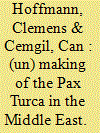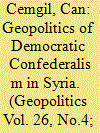|
|
|
Sort Order |
|
|
|
Items / Page
|
|
|
|
|
|
|
| Srl | Item |
| 1 |
ID:
153878


|
|
|
|
|
| Summary/Abstract |
Turkey’s foreign policy activism has received mixed reviews. Some feel threatened by the alleged increasing Islamization of the country’s foreign policy, sometimes called ‘neo-Ottomanism’, which is seen as a significant revision of Turkey’s traditional transatlanticism. Others see Turkey as a stable democratic role model in a troubled region. This debate on Turkish foreign policy (TFP) remains dominated by a sense of confusion about what appear to be stark contradictions that are difficult to make sense of. Intervening in this debate, this article will develop an alternative perspective to existing accounts of Turkey’s new foreign policy. Offering a historical sociological approach to foreign policy analysis, it locates recent transformations in Turkey’s broader strategies of social reproduction. It subsequently argues that, contrary to claims about Turkey’s ‘axis shift‘, its changing foreign policies have in fact never been pro-Western or pro-American. All foreign policy ‘shifts’ and ‘inconsistencies’, we argue, are explicable in terms of historically changing strategies of social reproduction of the Ottoman and Turkish states responding to changing domestic and international conditions.
|
|
|
|
|
|
|
|
|
|
|
|
|
|
|
|
| 2 |
ID:
183472


|
|
|
|
|
| Summary/Abstract |
The emerging socio-political entity of the Democratic Federation of Northern Syria (DFNS), lauded and criticised for its proclaimed progressive model, gave rise to by now a sizable literature on its now seven-year-old self-styled stateless, gender-egalitarian, ecological, direct-democratic social experiment that is referred to as democratic confederalism. Its alternative spatiality, however, received relatively less attention. In cases when it did, the dominant spatial organisation of political rule, that is, exclusive, national and territorial statehood became the point of reference. Building on the always contested and never absolute nature of the modern spatiopolitical order, this paper raises the problem of alternative spatial organization of political rule on the basis of the democratic confederalist experiment in Northern Syria. Drawing on a notion of strategies of spatialisation, understood as the practical ways of agents to deal with what is external to them as part of reproducing themselves and their spatiality, it argues that democratic confederalism as the spatialisation strategy of the DFNS constitutes an alternative mode of spatialisation, but its concrete shape is determined as much by its interaction with the spatialisation strategies of others, that is, by geopolitics, as it is by the practices and intentions of those who formulated it.
|
|
|
|
|
|
|
|
|
|
|
|
|
|
|
|
|
|
|
|
|